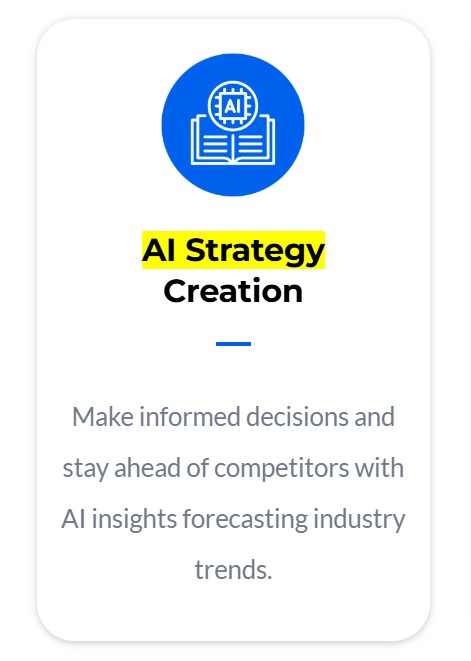In a world increasingly driven by data and technology, developing a robust AI strategy framework is no longer optional. It is essential for organizations looking to thrive in the digital age. With AI’s rapid advancements, businesses that leverage AI effectively gain a significant competitive edge.
What is an AI Strategy Framework?
An AI strategy framework is a structured approach that outlines how an organization will integrate artificial intelligence into its operations. It acts as a roadmap, guiding businesses through the complexities of AI implementation. The framework helps align AI initiatives with business goals, ensuring that every effort leads to tangible results.
Key Components of an AI Strategy Framework
1. Vision and Goals
Every successful AI strategy begins with a clear vision. What does your organization aim to achieve through AI? Whether it’s enhancing customer service, automating processes, or gaining insights from data, setting specific goals will provide direction.
2. Data Management
Data is the lifeblood of AI. A solid data strategy involves collecting high-quality data, managing it effectively, and ensuring its accessibility. Organizations must invest in data governance practices to maintain data integrity and compliance. Without a robust data foundation, AI projects may falter.
3. Technology Infrastructure
Having the right technology in place is crucial for AI success. This includes choosing appropriate AI tools and platforms that fit your organization’s needs. Cloud computing, machine learning frameworks, and analytics tools play significant roles in creating a supportive technology ecosystem.
4. Skills and Talent Development
As AI evolves, so does the need for skilled professionals. Organizations must assess their existing workforce and identify gaps in knowledge. Investing in training and development ensures that employees have the skills needed to implement and manage AI technologies effectively.
5. Governance and Ethics
AI implementation comes with ethical considerations. Establishing governance frameworks helps organizations navigate issues related to data privacy, algorithmic bias, and transparency. Ensuring ethical AI practices fosters trust among stakeholders and customers.
6. Implementation Roadmap
An implementation roadmap outlines the steps necessary to execute the AI strategy. It should include timelines, milestones, and performance indicators to measure success. This roadmap acts as a guide for teams, keeping everyone focused on achieving their objectives.
Benefits of an AI Strategy Framework
Implementing a well-defined AI strategy framework offers several advantages:
- Alignment with Business Objectives:
A structured approach ensures that AI initiatives align with overall business goals, maximizing the return on investment.
- Enhanced Decision-Making:
AI provides data-driven insights that help organizations make informed decisions, reducing uncertainty.
- Increased Efficiency:
By automating routine tasks, employees can focus on higher-value activities, improving productivity.
- Competitive Advantage:
Organizations that effectively implement AI can outperform competitors by innovating faster and delivering superior customer experiences.
- Scalability:
A solid framework allows businesses to scale their AI initiatives as they grow, adapting to new challenges and opportunities.
Steps to Implement an AI Strategy Framework
Implementing an AI strategy framework involves a series of thoughtful steps:
- Assess Current Capabilities:
Start by evaluating your organization’s current data infrastructure, technology, and workforce skills. Identify areas for improvement.
- Define Clear Objectives:
Establish specific, measurable objectives that align with your organization’s vision. This clarity will guide your AI initiatives.
- Develop a Comprehensive Data Strategy:
Create a plan for data collection, management, and analysis. Ensure data quality and accessibility to support AI projects.
- Choose the Right Technologies:
Research and select AI tools and platforms that best suit your organizational needs. Invest in scalable solutions that can grow with your business.
- Build a Skilled Team:
Identify skill gaps within your team and invest in training or hiring new talent. A knowledgeable workforce is crucial for AI success.
- Implement Governance Policies:
Develop policies to address ethical considerations and ensure responsible AI use. This helps maintain trust among customers and stakeholders.
- Create an Implementation Roadmap:
Outline the necessary steps, timelines, and performance indicators for executing the strategy. A clear roadmap keeps teams aligned and focused.
- Monitor and Adapt:
Continuously track the performance of your AI initiatives. Be prepared to adjust strategies based on feedback and evolving business needs.
Conclusion
Creating an AI strategy framework is essential for organizations aiming to thrive in the digital landscape. By focusing on clear objectives, robust data management, and ethical governance, businesses can effectively leverage AI to drive innovation and success. The time to act is now—start crafting your AI strategy framework today.
Ready to enhance your business with an AI strategy framework? Contact us today for expert guidance on implementing AI effectively and achieving your goals!


